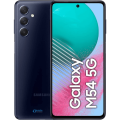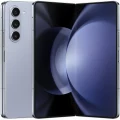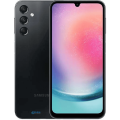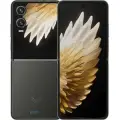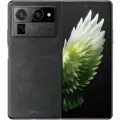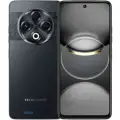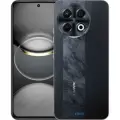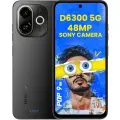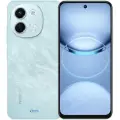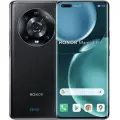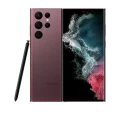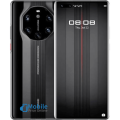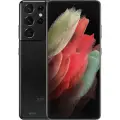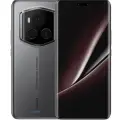Samsung Galaxy Note10+
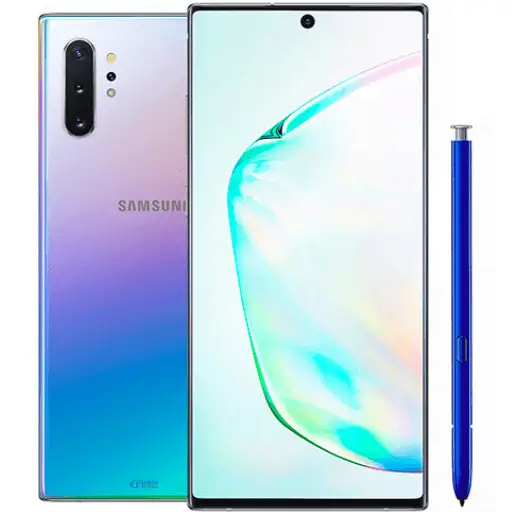



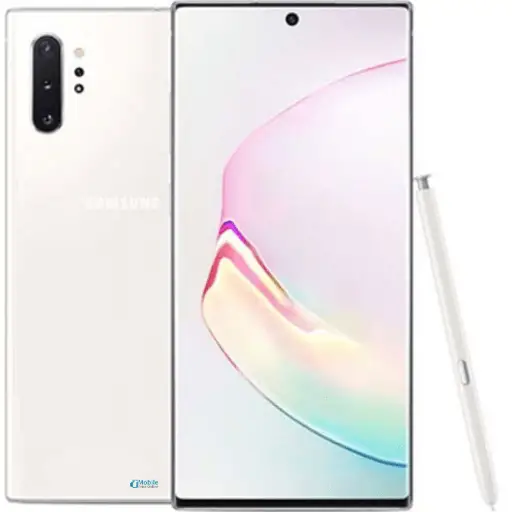
-
Released: 2019, August
-
OS: Android 9.0; One UI
-
Display: 6.8" 1440x3040 pixels
-
Camera: 12MP 2160p
-
RAM: 12GB RAM Exynos 9825
-
Battery: 4300mAh Li-Ion
Full Specifications and Price in Bangladesh
General Info
| Announced | 2019, August |
| Status | Available |
| Brand | Samsung |
| Model | Samsung Galaxy Note10+ |
| Color | Aura Glow, Aura White, Aura Black, Aura Blue |
| Made by | Korea |
| Price |
Official (12GB+256GB) ৳1,13,900 |
Network
| Technology | GSM / CDMA / HSPA / EVDO / LTE |
| 2G Bands |
GSM 850 / 900 / 1800 / 1900 - SIM 1 & SIM 2 (dual-SIM model only) CDMA 800 / 1900 - USA |
| 3G Bands |
HSDPA 850 / 900 / 1700(AWS) / 1900 / 2100 CDMA2000 1xEV-DO - USA |
| 4G Bands |
1, 2, 3, 4, 5, 7, 8, 12, 13, 17, 18, 19, 20, 25, 26, 28, 32, 38, 39, 40, 41, 66 - Global, LATAM 1, 2, 3, 4, 5, 7, 8, 12, 13, 14, 18, 19, 20, 25, 26, 28, 29, 30, 46, 48, 66, 71 - USA 1, 2, 3, 4, 5, 7, 8, 12, 13, 18, 19, 20, 25, 29, 30, 38, 39, 40, 41, 46, 66, 71 - Canada |
| 5G Bands | N/A |
| Speed | HSPA 42.2/5.76 Mbps, LTE (7CA) Cat20 2000/150 Mbps |
| GPRS GPRS (General Packet Radio Service) is a packet oriented mobile data service on the 2G and 3G cellular communication system's global system for mobile communications (GSM), Generally, GPRS is used for the purpose of wireless data transfer, such as sharing pictures and videos or browsing the Internet via a mobile phone connection. | |
| EDGE EDGE (Enhanced Data GSM Environment) is a wireless network technology generally considered the next step in the 2G network offers data transfer rates up to four times faster than ordinary GSM networks, Generally, EDGE is used for the purpose of wireless data transfer, such as sharing pictures and videos or browsing the Internet via a mobile phone connection. |
Body
| Dimensions | 162.3 x 77.2 x 7.9 mm (6.39 x 3.04 x 0.31 in) |
| Weight | 196 g (6.91 oz) |
| Build | Glass front (Gorilla Glass 6), glass back (Gorilla Glass 6), aluminum frame |
| SIM SIM (Subscriber Identity Module) is a small card that contains mobile network subscriber's account information. This allows the phone using the card to attach to a mobile network. The SIM card is most commonly associated with GSM and UMTS mobile networks. Moving a SIM card from one phone to another allows a subscriber to switch mobile phones without having to contact their mobile network carrier. SIM cards can also be used by a phone to store limited amounts of data, such as phone numbers and text messages. | Single SIM (Nano-SIM) or Hybrid Dual SIM (Nano-SIM, dual stand-by) |
Display
| Type Design Type called form factor refers to a mobile phone's size, shape, and style as well as the layout and position of major components of phone. There are three major form factors seen in mobile phones => bar phones, folding phones and sliding phones. | Dynamic AMOLED, HDR10+ |
| Size | 6.8 inches, 114.0 cm2 (~91.0% screen-to-body ratio) |
| Resolution | 1440 x 3040 pixels, 19:9 ratio (~498 ppi density) |
| Refresh Rate | 60 Hz |
| Protection |
Corning Gorilla Glass 6 |
| Pixel Density Pixel Density (PPI) is refers to the concentration of pixels on a particular display, measured in pixels per inch (ppi). Pixel density is calculated by dividing the diagonal pixel resolution of a display by its diagonal size, higher pixel density better display quality. | 498 ppi density |
| Multitouch | |
| Features |
- SMS(threaded view), MMS, Email, Push Email, IM - XviD/MP4/H.265 player - MP3/WAV/eAAC+/Flac player - Photo/video editor - Document viewer |
Platform
| Operating System OS => Every computer system run on a base software called Operating System (OS). Operating System controls all basic operations of the computer (such as smartphone, PDAs, tablet computers and other handheld devices). The Operating System allows the user to install and run third party applications (apps), apps are used to add new functionality to the device. | Android 9.0 (Pie), upgradable to Android 12, One UI 4 |
| Chipset Chipset is a group of integrated circuits designed to perform one or a more dedicated functions, often with real time computing constraints, Popular smartphones are equipped with more advanced embedded chipsets that can do many different tasks depending on their programming. | Exynos 9825 (7 nm) - EMEA/LATAM Qualcomm SM8150 Snapdragon 855 (7 nm) - USA/China |
| CPU CPU (Central Processing Unit) mostly known as processors, CPU processes instructions in order to carry out certain functions that make your device operate properly. Processors are often described as the brain of computers, smartphones and tablets, Smartphones and tablets rely on processors to carry out their every task, Processors are an incredibly important factor in selecting any type of computing device, including your smartphone. | Octa-core (2x2.73 GHz Mongoose M4 & 2x2.4 GHz Cortex-A75 & 4x1.9 GHz Cortex-A55) - EMEA/LATAM Octa-core (1x2.84 GHz Kryo 485 & 3x2.42 GHz Kryo 485 & 4x1.78 GHz Kryo 485) - USA/China |
| GPU GPU (Graphics Processing Unit) is a single-chip processor designed to rapidly manipulate and alter memory to accelerate the creation of images in a frame buffer intended for output to a display, This includes things such as lighting effects, object transformations, and 3D motion. | Mali-G76 MP12 - EMEA/LATAM Adreno 640 - USA/China |
Memory
| Card Slot Memory Card Slot is a special slot for inserting a memory card. Memory cards allow you to expand the phone's built-in memory, A memory card (sometimes called a flash memory card or a storage card) is a small storage medium used to store data such as text, pictures, audio, and video, for use on small, portable or remote computing devices such as mobile phones, mp3 players, digital cameras. | Micro SDXC (uses shared SIM slot) - dual SIM model only |
| RAM RAM (Random Access Memory) is a type of computer memory that can be accessed randomly, any byte of memory can be accessed without touching the preceding bytes that allows information to be stored and accessed quickly from random locations. RAM is the most common type of memory found in computer systems, smartphones, tablets and other electronic devices. | 12 GB |
| Internal Internal Storage is a data storage space (flash memory) mostly used in smartphones, tablets and other electronic devices where operating system, apps, music, photos, videos, files and other user data Is stored. | 256/512 GB UFS 3.0 |
Main Camera
| Camera Resolution |
12 MP, f/1.5-2.4, 27mm (wide), 1/2.55", 1.4µm, dual pixel PDAF, OIS 12 MP, f/2.1, 52mm (telephoto), 1/3.6", 1.0µm, PDAF, OIS, 2x optical zoom 16 MP, f/2.2, 12mm (ultrawide), 1/3.1", 1.0µm, Super Steady video 0.3 MP, TOF 3D, (depth) |
| Camera Features |
LED flash, auto-HDR, panorama |
| Video Resolution | 4K@30/60fps, 1080p@30/60/240fps, 720p@960fps, HDR10+, stereo sound rec., gyro-EIS & OIS |
Selfie Camera
| Camera Resolution |
10 MP, f/2.2, 26mm (wide), 1/3", 1.22µm, dual pixel PDAF |
| Camera Features |
Dual video call, Auto-HDR |
| Video Resolution | 4K@30/60fps |
Sound
| Alert Types | Vibration, MP3, WAV ringtones |
| Loudspeaker | Yes, with stereo speakers |
| Audio Jack |
Connectivity
| WLAN | Wi-Fi 802.11 a/b/g/n/ac/ax, dual-band, Wi-Fi Direct, hotspot |
| Bluetooth Bluetooth is a wireless communications technology for exchanging data between mobile phones, headsets, computers and other network devices over short distances without wires, Bluetooth technology was primarily designed to support simple wireless networking of personal consumer devices. | 5.0, A2DP, LE, aptX |
| GPS GPS The Global Positioning System is a satellite-based radio navigation system, GPS permits users to determine their position, velocity and the time 24 hours a day, in all weather, anywhere in the world, In order to locate your position, your device or GPS receiver must have a clear view of the sky. | Yes, with A-GPS, GLONASS, BDS, GALILEO |
| NFC NFC (Near field communication) is a set of standards for smartphones and similar devices to establish peer-to-peer radio communications with each other by touching them together or bringing them into proximity, usually no more than a few inches. | |
| Infrared port | |
| FM Radio | |
| USB | 3.1, Type-C 1.0 reversible connector |
Features
| Sensors Sensors are electronic components that detects and responds to some type of input from the physical environment. The specific input could be light, heat, motion, moisture, pressure and location, The output is generally a signal that is converted to use in computing systems, a location sensor, such as a GPS receiver is able to detect current location of your electronic device. |
Fingerprint (under display, ultrasonic), accelerometer, gyro, proximity, compass, barometer Samsung DeX (desktop experience support) ANT+ Bixby natural language commands and dictation |
| Messaging | SMS(threaded view), MMS, Email, Push Email, IM |
| Browser Web Browser => a web browser is a software application used to locate, retrieve and display content on the World Wide Web, including Web pages, images, video and other files, The primary function of a web browser is to render HTML, the code used to design or markup webpages. | HTML5 |
| Java |
Battery
| Battery Type Battery Type => Cell phones run on various kinds of batteries depending on the manufacturer, phone size or shape and features. There are basically four types of cell phone batteries => Lithium Polymer, Lithium Ion, Nickel Metal Hydride and Nickel Cadmium. | Non-removable Li-Ion |
| Battery Capacity Battery Capacity is a measure (typically in Amp-hr) of the charge stored by the battery, and is determined by the mass of active material contained in the battery. The battery capacity represents the maximum amount of energy that can be extracted from the battery under certain conditions. | 4300 mAh |
| Charging Wireless Charging (Inductive Charging) uses an electromagnetic field to transfer energy between two objects. This is usually done with a charging station. Energy is sent through an inductive coupling to an electrical device, which can then use that energy to charge batteries or run the device. |
Fast battery charging 45W USB Power Delivery 3.0 Fast Qi/PMA wireless charging 15W Power bank/Reverse wireless charging 9W |
| Fast Charging | |
| Wireless Charging |
Samsung Galaxy Note10+: Overview
The Samsung Galaxy Note10+ is a premium flagship smartphone that combines powerful performance, an expansive display, and productivity features with the renowned S Pen. Featuring a 6.8-inch Dynamic AMOLED display with Quad HD+ resolution, it delivers stunning visuals, making it ideal for media consumption, gaming, and productivity. Powered by the Exynos 9825 (or Snapdragon 855 in some regions) chipset and paired with 12GB of RAM, the Galaxy Note10+ handles multitasking, gaming, and demanding applications smoothly.
The phone includes a versatile quad-camera setup with a 12MP primary sensor, a 12MP telephoto lens, a 16MP ultra-wide camera, and a DepthVision sensor for enhanced AR capabilities. A 4,300mAh battery ensures long-lasting performance, and with 45W fast charging support, the Note10+ recharges quickly. The S Pen adds functionality for note-taking, drawing, and remotely controlling the device.
Price in Bangladesh:
The Samsung Galaxy Note10+ is priced between BDT 113,900 and BDT 120,000, depending on the retailer and ongoing offers.
Pro and Cons
Pros:
- Stunning Display: The 6.8-inch Dynamic AMOLED display with Quad HD+ resolution offers sharp and vibrant visuals, perfect for gaming, streaming, and productivity.
- Powerful Performance: With the Exynos 9825 (or Snapdragon 855) and 12GB of RAM, the phone handles multitasking and demanding apps smoothly.
- Versatile Camera Setup: The quad-camera system provides excellent photography and videography options, including ultra-wide, telephoto, and depth sensing for AR features.
- S Pen Functionality: The S Pen adds a layer of productivity, allowing users to take notes, draw, and control the phone using Air Actions.
- Fast Charging: The 4,300mAh battery supports 45W fast charging, ensuring the phone recharges quickly and wireless and reverse wireless charging.
Cons:
- High Price: The Galaxy Note10+ comes with a premium price tag, which may only be affordable for some users.
- No Headphone Jack: Like many modern flagships, the Note10+ does not feature a 3.5mm headphone jack.
- Large Size: The 6.8-inch screen may need to be more significant for users who prefer more compact devices.
- No Expandable Storage in Some Variants: Some variants may lack the option for expandable storage, limiting users to internal storage only.
FAQs
1. Does the Samsung Galaxy Note10+ support fast charging?
Yes, the Galaxy Note10+ supports up to 45W fast charging, allowing quick recharges. It also supports wireless and reverse wireless charging.
2. Is the Galaxy Note10+ water-resistant?
Yes, the Galaxy Note10+ has an IP68 rating, meaning it is resistant to water and dust and can survive in up to 1.5 meters of water for 30 minutes.
3. What Android version does the Galaxy Note10+ run on?
The Galaxy Note10+ comes with One UI 2.1, based on Android 10, with updates available for newer Android versions.
4. Does the Galaxy Note10+ have expandable storage?
Yes, the Galaxy Note10+ supports expandable storage via a microSD card, allowing users to add up to 1TB of additional storage.
5. What is the purpose of the S Pen?
The S Pen allows users to take notes, draw, and remotely control the device using Air Actions, making it perfect for productivity and creativity.
Reason to Buy
- Expansive, High-Quality Display: The 6.8-inch Quad HD+ Dynamic AMOLED display offers an immersive viewing experience, making it ideal for watching videos, playing games, and multitasking.
- Top-Tier Performance: The Exynos 9825 (or Snapdragon 855) chipset, combined with 12GB of RAM, ensures smooth performance across all apps, games, and multitasking scenarios.
- S Pen for Productivity: The S Pen adds unmatched functionality, perfect for taking notes, drawing, and controlling presentations, making it ideal for professionals and creatives.
- Versatile Quad-Camera System: The quad-camera setup allows for stunning photos and videos, including ultra-wide and portrait shots, ensuring you capture every moment in high quality.
- Fast Charging and Long Battery Life: With a 4,300mAh battery and 45W fast charging, the Galaxy Note10+ ensures all-day usage and quick recharges when needed.
The Samsung Galaxy Note10+ is the perfect choice for users who demand a large, vibrant display, top-tier performance, and productivity features, especially with the added S Pen functionality. It’s ideal for professionals, creatives, and tech enthusiasts looking for a high-performance, feature-packed smartphone.
Disclaimer Note
We do not guarantee that the information of this page is 100% accurate and up to date.

